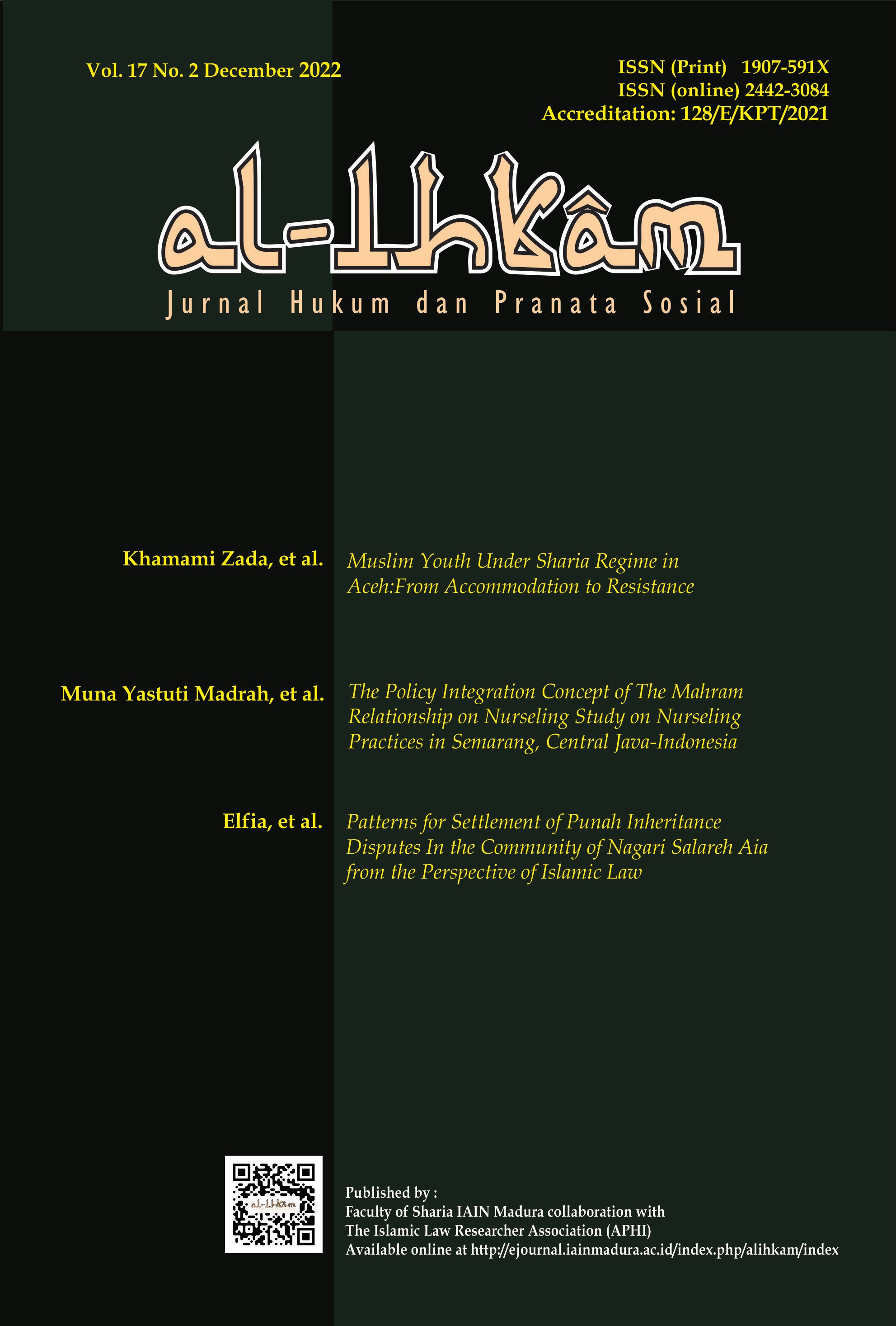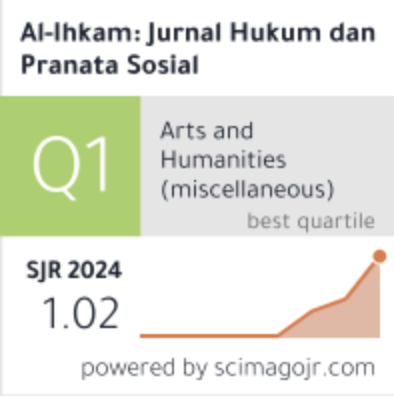Waqf, Maqasid al-Sharia, and SDG-5: A Model for Women’s Empowerment
 Abstract views: 1738
,
Abstract views: 1738
,
 PDF downloads: 1390
PDF downloads: 1390
Abstract
This study aims to provide an alternative waqf model as Islamic social finance in realizing Sustainable Development Goals (SDGs)-5, namely gender equality and correlate it with Maqashid al-Sharia. This study uses the Analytic Network Process (ANP). ANP is needed in the problem decomposition framework to structure complexity. There are 16 experts as the respondents. From the results of the ANP, it will also be known what the SDGs criteria, maqashid al-sharia components, and waqf models are priorities in realizing the 5th SDGs. The findings of this study reveal that among the other two, social pillars are the main criteria for the SDGs. In addition, the maqashid al-sharia framework's main objective is preserving religion (deen) as a means of enforcing religious responsibilities. Therefore, stakeholders need to consider this element. Then, according to this study, the best alternative waqf model is Waqf & Zakat, Infaq, Shadaqah (ZIS), which is very suitable for gender equality within the framework of women's empowerment in terms of education, entrepreneurship, and other life skills.
Downloads
References
A.A. Ibrahim and, N.A.B Ahmad. “Empowering Society Through Waqf Bazars: A Case Study in Kelantan, Malaysia.” New Developments in Islamic Economic, 2006, 83–98.
Abdurrehman, Hafiz, Hamid Hasan, Malik Muhammad, H Abdurrehman, H Hasan, and M ( Muhammad. “Compatibility of Sustainable Development Goals (SDGs) with Maqasid Al-Shariah: Are There Any Missing Goals.” Islamic Banking and Finance Review 8, no. 2 (2021): 109–32.
Abdurrohman Kasdi. “Filantropi Islam Untuk Pemberdayaan Ekonomi Umat (Model Pemberdayaan ZISWAF Di BMT Se- Kabupaten Demak).” Iqtishadia: Jurnal Kajian Ekonomi Dan Bisnis Islam STAIN Kudus 9, no. 2 (2016).
Abu Bakr Ahmad b. Amar al-Khassaf. “Ahkām Al-Awqāf, Cairo, Diwan Umum Al-Awqāf Al-Miṣriyah,” 1904.
Al-Darmi, Abd-Allah b. Abd al-Rahman. Sunan Al-Darmi, Beirut, Dar Al-Kitab Al-Arabi, 1407.
Al-Dhahabi, Shams al-Din. “Tarikh Al-Islām, Beirut, Dar Al-Kitab AlArabi,” 1987.
Al-Humaidan, Iman Muhammad. “Al-Mar’ah Wa’l-Waqf – Al-’Ilaqah Altabaduliyah (Woman and Waqf – Mutual Relation), Kuwait, Al-Amanat AlAmmah Li’l-Awqāf,” 2016.
Amuda, Y. J., D. A. Razak, and A. A. Ahmed. “Application of Cash Waqf in the Empowerment of Widows in Malaysia.” Journal of Advanced Management Science 4, no. 3 (2016): 255–59. https://doi.org/10.12720/joams.4.3.255-259.
As-Salafiyah, Aisyah, Aam Slamet Rusydiana, and Muhammad Isa Mustafa. “Maqashid Sharia-Based Mosque Empowerment Index.” International Journal of Ethics and Systems 38, no. 2 (2022): 173–90. https://doi.org/10.1108/IJOES-06-2021-0122.
———. “Meta Analysis on Mosque Economics.” Library Philosophy and Practice 2021 (2021).
Ascarya, Ascarya, Ugi Suharto, and Jardine A. Husman. “Proposed Model of Integrated Islamic Commercial and Social Finance for Islamic Bank in Indonesia.” Eurasian Economic Review 12, no. 1 (2022): 115–38. https://doi.org/10.1007/s40822-022-00201-z.
Azis, I. J. “Analytic Network Process with Feedback Influence: A New Approach to Impact Study.” In Paper for Seminar Organized by Department of Urban and Regional Planning, University of Illinois at Urbana-Campaign, 2003.
Azwar Iskandar, Bayu Taufiq Possumah, Khaerul Aqbar, Akhmad Hanafi Dain Yunta. “Islamic Philanthropy and Poverty Reduction in Indonesia: The Role of Integrated Islamic Social and Commercial Finance Institutions.” Al-Ihkam: Jurnal Hukum Dan Pranata Sosial 16, no. 2 (2021).
Shukurat Moronke Bello. “The Role of Waqf in Enhancing the Financial Inclusion of Women Entrepreneurs in Developing Countries.” Journal of Islamic Business and Management (JIBM) 12, no. 01 (2022): 125–38. https://doi.org/10.26501/jibm/2022.1201-009.
Berkey, J. The Transmission of Knowledge in Medieval Cairo. Princeton: Princeton University Press, 1992.
Borgatta, E. F, and M. L Borgatta (ed.). Encyclopedia of Sociology. New York: Macmillan Publishing Company, 1984.
Fay, Mary Am. “‘Women and Waqf: Towards a Reconsideration of Women’s Place in the Mamluk Household.’” International Journal of Middle East Studies 29, no. 1 (1997): 33–51.
Habibi, M. Lutfillah, and Ana Toni Roby Candra Yudha. 2017. “Membangun Integrated Takaful Dan Wakaf Model Dalam Upaya Meningkatkan Kemanfaatan Pemegang Polis”. Al-Uqud: Journal of Islamic Economics 1 (2):139-55. https://doi.org/10.26740/al-uqud.v1n2.p139-155.
Hadiningrum, Lila Pangestu, Ning Karnawijaya, and Siti Rokhaniyah. “Nazhir’s Development of Fundraising and Business Incubators through the Development of Waqf Villages Assisted.” In Proceeding of 1st International Conference on Research and Development (ICORAD) 2021, 1:46–50, 2021.
Hariyanto, Erie, Muhammad Taufiq, Zainal Abidin, Miftahul Ulum, and Maimun. “Effectiveness of the Economic System to Zakat and Waqf for Empowerment of the Ummah in Indonesia.” International Journal of Advanced Science and Technology 29, no. 06 (2020): 1910–16. http://sersc.org/journals/index.php/IJAST/article/view/12895.
Ibn Battutah. Rihlah Ibn Baṭṭuṭah, Beirut, Dar Beirut Li Al-Tiba’ah Wa Al-Nashr, 1985.
Idrus, A. “Analisis Atas Lembaga Wakaf Dalam Menjalankan Wakaf Produktif Pada Yayasan Dompet Dhuafa.” Misykat Al-Anwar Jurnal Kajian Islam Dan Masyarakat 3, no. 2 (2020): 311–28. https://doi.org/10.24853/ma.3.
Iska, Syukri, David David, Elsy Renie, and Ifelda Nengsih. “Implications of the Pagang Gadai Contract on Disharmony Social Actors in Minangkabau Community.” JURIS (Jurnal Ilmiah Syariah) 21, no. 1 (June 9, 2022): 27–37. https://doi.org/10.31958/JURIS.V21I1.5647.
Islahi, Abdul Azim. “The Role of Women in the Creation and Management of Awqāf: A Historical Perspective.” Intellectual Discourse 26 (2018): 1025–46.
———. “Waqf: A Bibliography, Jeddah.” In Scientifc Publishing Centre. King Abdulaziz University, 2003.
Kassim, Marina, Nor Azizan Che Embi, Razali Haron, and Khairunisah Ibrahim. 2022. “The Determinants of Cash Waqf Re-Endow Intention in Malaysia”. Al-Uqud: Journal of Islamic Economics 7 (1). https://journal.unesa.ac.id/index.php/jie/article/view/17508.
Laldin, Mahmud, and Sawari. “Maqasid Al-Shariah Dalam Pelaksanaan Wakaf.” Jurnal Pengurusan JAWHAR 2, no. 2 (2012): 1–25.
Loiseau, Julien. “‘Boy and Girl on Equal Terms’: Women, Waqf, and Wealth Transmission in Mamluk Egypt.” Orient 54 (2019): 23–39.
Mohsin, Asad, Noriah Ramli, and Bader Abdulaziz Alkhulayfi. “Halal Tourism: Emerging Opportunities.” Tourism Management Perspectives 19, no. 2016 (2016): 137–43. https://doi.org/10.1016/j.tmp.2015.12.010.
Nurasyiah, Aas, Lubna Sarwath, A. Jajang W. Mahri, Ripan Hermawan, and Gina Destrianti Karmanto. 2022. “Reducing Family Poverty through an Islamic women’s Empowerment Strategy in Indonesia: An Analytical Network Process Approach”. Al-Uqud: Journal of Islamic Economics 6 (2):206-19. https://doi.org/10.26740/aluqud.v6n2.p206-219.
Pantık, Ramazan. Atik Valide Sultan Külliyesi (1686-1727). Ankara: Hacettepe Universitesi, 2014.
Prasada, Erisa Ardika, Joni Emirzon, and K. N.Sofyan Hasan. “Philosophy to Strengthen Baitul Maal Wat Tamwil Law in Indonesia.” Sriwijaya Law Review, 2020. https://doi.org/10.28946/slrev.Vol4.Iss2.432.pp270-284.
Peri, Oded. “Waqf and Ottoman Welfare Policy: The Poor Kitchen of Hasseki Sultan in Eighteenth-Century Jerusalem.” Journal of the Economic and Social History of the Orient 35 (1989): 167–86.
Rahman, and Ahmad. “Pengukuran Keberkesanan Agihan Zakat: Perspektif Maqasid Al-Syariah.” Proceedings of Seventh International Conference, The Tawhidi Epistemology, Zakat and Waqf Economy, Bangi, 2010, 447–60.
Rozalinda, Rozalinda. “Peran Wakaf Dalam Pemberdayaan Ekonomi Perempuan.” Kafa`ah: Journal of Gender Studies 2, no. 1 (2014): 39. https://doi.org/10.15548/jk.v2i1.40.
Rusydiana, Aam S, and Abrista Devi. Analytic Network Process : Pengantar Teori Dan Aplikasi, 2013.
Rusydiana, Aam Slamet, Raditya Sukmana, and Nisful Laila. “Waqf on Education: A Bibliometric Review Based on Scopus.” Library Philosophy and Practice 2021 (2021).
Rusydiana, Aam Slamet, Yayat Hidayat, Tika Widiastuti, and Solihah Sari Rahayu. 2020. “Cash Waqf for Developing Islamic Economy: Case Study in Indonesia”. Al-Uqud: Journal of Islamic Economics 5 (1):43-59. https://doi.org/10.26740/al-uqud.v5n1.p43-59.
Saaty, T. L. “Decision Making with Dependence and Feedback: The Analytic Network Process.” In Pittsburgh: RWS Publicatios, 1996.
———. “Theory and Applications of the Analytic Network Process: Decision Making with Benefits, Opportunities, Costs, and Risks.” RWS Publicatios, 2005.
Saaty, T. L., and L. G. Vargas. “Decision Making with the Analytic Network Process.” Springer Science+ Business Media LLC (2006): 282.
Saaty, Thomas L, and Luis G Vargas. Decision Making With The Analytic Network Process. Springer, 2006.
Sabotic, I. “The Waqf Formation of Tuzla’s Beneficiary Tahira-Hanuma Tuzlic Property.” Historical Views 94, no. 093 (2021): 51–69.
Sipahi, S., and M. Timor. “The Analytic Hierarchy Process and Analytic Network Process: An Overview of Applications.” Management Decision, 2010.
Soemitra, Andri, Kusmilawaty, and Tri Inda Fadhila Rahma. “The Role of Micro Waqf Bank in Women’s Micro-Business Empowerment through Islamic Social Finance: Mixed-Method Evidence from Mawaridussalam Indonesia.” Economies 10, no. 7 (2022). https://doi.org/10.3390/economies10070157.
Widiastuti, Tika, Imron Mawardi, Anidah Robani, and Aam Slamet Rusydiana. “Optimization of Zakat Fund Management in Regional Zakat Institution.” Humanities and Social Sciences Reviews 6, no. 2 (2018). https://doi.org/10.18510/hssr.2018.6217.
Copyright (c) 2022 AL-IHKAM: Jurnal Hukum & Pranata Sosial

This work is licensed under a Creative Commons Attribution-ShareAlike 4.0 International License.
In order to be accepted and published by Al-Ihkam: Jurnal Hukum dan Pranata Sosial, author(s) submitting the article manuscript should complete all the review stages. By submitting the manuscript, the author(s) agreed to the following terms:
- The copyright of received articles shall be assigned to Al-Ihkam: Jurnal Hukum dan Pranata Sosial as the publisher of the journal. The intended copyright includes the right to publish articles in various forms (including reprints). Al-Ihkam: Jurnal Hukum dan Pranata Sosial maintain the publishing rights to the published articles.
- Authors are permitted to disseminate published articles by sharing the link/DOI of the article at Al-Ihkam: Jurnal Hukum dan Pranata Sosial. Authors are allowed to use their articles for any legal purposes deemed necessary without written permission from Al-Ihkam: Jurnal Hukum dan Pranata Sosial with an acknowledgment of initial publication to this journal.
- Users/public use of this website will be licensed to CC-BY-SA.



.png)
_1.png)


_page-00011.jpg)


